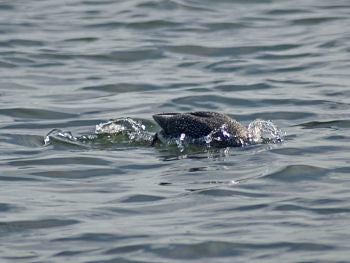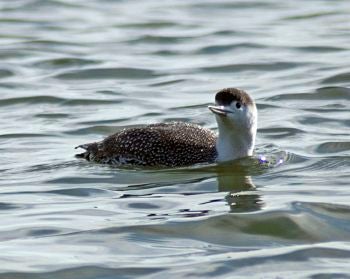
La página que intenta visitar sólo está disponible en inglés. ¡Disculpa!
The page you are about to visit is currently only available in English. Sorry!


A red-throated loon, the friendly-looking creature that taunted the author. Photo by John Kennedy
The following first appeared in The New York Times, May 27, 2009.
When I’m heading off on assignment as a wildlife writer, to study spider webs in Costa Rica, or chase lemurs in Madagascar, people often say, “You’re going where? You’re going to do what?” Doubtfully, they add, “And somebody’s actually paying you for this?” Then they ask if they can come along. Secretly, my neighbors suspect that I am a hit man.
Lately, though, I’ve been traveling less, because of a book deadline and also because the magazines that employ me are feeling the economic pain like everybody else. (Heck, even the murder-for-hire business has gone all wait-and-see.) So I’ve been thinking more about what used to be my stock reply: You don’t have to go anywhere to see animals do interesting stuff. Or rather, you just have to go outside.
People who do dumb stuff like racing red-throated loons down a beach in the dead of winter are liable to get a reputation for being a little nuts. But I prefer to think of it as what makes me almost sane.
I live near Long Island Sound, and one day this past fall, a school of Atlantic menhaden swarmed in close along a rocky shoreline. Unless you get excited about fish oil, menhaden, also known as pogies, aren’t too sensational. A government agency once summed up their special charm in a pamphlet with the title “Menhaden: Soybean of the Sea.” But this little school was terrified, flashing across the shallows first one way, then another, their flanks breaking the surface like a silver cloudburst of second-place medals.
I climbed out onto a rock, and right at my feet, I could see the source of their terror. The big dark bluefish came sharking in among them, their dorsal fins slicing the surface. A bloom of red appeared and then went sluicing out with the tide, leaving behind a menhaden skewed sideways, a bloody stump where its tail used to be. Then another cloud of red blossomed, and another. I suppose I should have felt regret or dismay — the poor little pogies! But what I honestly felt was exhilaration at the close connection to the hunt, with life and death in the balance. It was at least as ferocious as seeing piranhas swarm in the Amazon, or African wild dogs take down an impala in the Okavango Delta.

Photo by John Kennedy
I should say that I also see nice things out on the beach. Friendly things. Deer come down to lick the salt, and one morning not long ago a couple of foxes gamboled back and forth across the dunes at sunrise.
Courtesy of John KennedyThe friendly-looking creature that taunted the author.
This winter, a red-throated loon showed up on calm days. In this species, the feet are placed so far back on the body that it can’t walk on land, except by shoveling itself along on its breast, wheel-barrow style. But underwater, where it hunts fish, it swam so fast that I had to guess where it was likely to surface, and then run to see if I could get there first. I think it knew what I was up to. It swam closer to the shore than necessary and seemed at times to be eyeing me sideways with mild Daffy Duck derision, just before it plunged manically back under. I eventually gave up on account of a dwindling sense of dignity.
People who do dumb stuff like racing red-throated loons down a beach in the dead of winter — or even just stopping to admire swans flying overhead, their wings creaking like door hinges — are liable to get a reputation for being a little nuts. But I prefer to think of it as what makes me almost sane. These encounters with the lords of life (and also with the soybeans) pull me up out of the pettiness and stupidity of my workaday life.
The pleasure of watching animals can of course also be selfish and stupid, tainted by the prospect of getting dinner, and the fear of being gotten for dinner. In the back of our minds, we’re wondering if they just might fill our appetites in the most literal way: Through the kindness of a neighbor with a fishing rod, we ate one of the bluefish that evening last fall, and it was good.
But there’s more to it than that. Watching animals fills some larger, less purposeful appetite in much the way that reading poetry does, or listening to music.

Photo by John Kennedy
One day a few years ago, I was watching two male cheetahs prowl through the bush, somewhere in the Serengeti. A biologist named Sarah Durant pointed out that both of them were pushing 12 on her belly-fullness scale, where a 14 corresponds roughly to “swallowed a basketball.” And yet they continually stopped to gaze at distant antelopes and wildebeests. “I often think they watch prey the way we watch television,” said Durant, “because it’s comforting and mindless.” It struck me that she was onto something important: Animals are built to watch other animals, and for animals like us, otherwise separated from the natural world, there’s consolation in it. Television is in truth a poor substitute.
You do not have to visit the Serengeti, or live near Long Island Sound, to experience it. In fact, I take back what I said earlier about having to go outside. A few paragraphs ago, I looked up to see a red-tailed hawk land in a tree 100 feet from where I’m sitting. It had its dinner, species unknown, stretched out on the branch between two feet, and it began to tread it to pieces with its sharp talons, a happy, abstracted expression on its face, which somehow brought to mind Julia Child in feathers working up a poulet sauté chasseur.
You can see the same thing any day in Prospect Park in Brooklyn, or Branch Brook Park in Newark, or with luck, in your own backyard, if you remember to look.
You can see interesting behaviors just by paying attention to ants on the front walk or the kitchen counter. And if watching ants seems a little beneath your sense of dignity (and I understand, though in my working life I have come to regard dignity as inversely proportional to effectiveness), then consider spider webs. One day a while back, I noticed a spider building one between the lamp and the telephone on my desk. It was a slow day, so I watched the way it yanked the silk from its spinnerets and wove it into the spokes and spirals of a delicately symmetrical orb web. I had work to do, and people I needed to speak with. But work isn’t, after all, the only important thing in our lives.
All things considered, I really did not want the phone to ring.
Richard Conniff’s new book, Swimming With Piranhas at Feeding Time: My Life Doing Dumb Stuff With Animals, is just out from W.W. Norton.